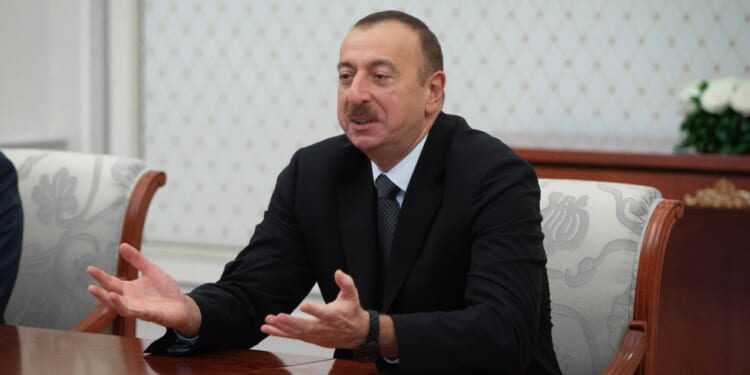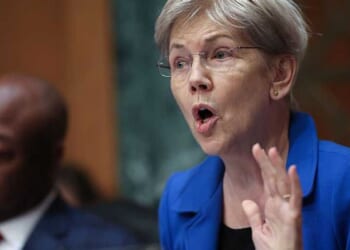The Trump administration can build on its peace-deal momentum and push out Chinese influence in the Caucasus.
From the US geopolitical perspective, Azerbaijan represents a pivotal strategic partner in Eurasia. Having played a key role in mediating a historic peace agreement between Azerbaijan and neighboring Armenia, the Trump administration must now recalibrate its broader foreign policy toward the Turkic nation to strengthen its ties with America.
Azerbaijan, the only state bordering both Russia and Iran, has emerged as a focal point of China’s deepening strategic and economic engagement. For the United States, Azerbaijan’s geoeconomic significance stems from its position as a critical energy supplier and transit hub that diversifies global routes while anchoring US access to Central Asia.
In recent months, a series of consequential developments has unfolded involving Azerbaijan and the United States’ three chief adversaries.
A day after Presidents Donald Trump and Ilham Aliyev and Prime Minister Nikol Pashinyan signed the agreement establishing the Trump Route for International Peace and Prosperity (TRIPP) through southern Armenia, Iranian Supreme Leader’s foreign affairs advisor Ali Akbar Velayati warned that Tehran would block any US-backed corridor in the Caucasus, deriding the TRIPP as a “graveyard for Trump’s mercenaries.”
In an August 27 interview with Al-Arabiya TV, Aliyev noted that following the collapse of the Russian Empire in 1917, the Azerbaijanis established the Azerbaijan Democratic Republic, which lasted until April 1920, when the Soviet Union absorbed it. Over the past six months, Aliyev has visited China twice, meeting Xi Jinping on April 23 in Beijing to elevate bilateral ties to a comprehensive strategic partnership, and again on August 31 on the sidelines of the SCO summit in Tianjin.
Together, these developments reveal both promise and peril for US interests in the South Caucasus and Central Asia.
When it comes to Iran, Azerbaijan is a natural strategic partner for Washington. As a secular, Shia-majority state on Iran’s northwestern frontier, it has long opposed the Islamic Republic, though regional constraints have historically limited its effectiveness as a counterbalance.
Azerbaijan’s victory in the 2020 war with Armenia, however, shifted the balance of power in the South Caucasus, enhancing its regional influence. More importantly, Iran’s recent setbacks in its conflict with Israel have created a timely opportunity for Baku to serve as a key US partner in managing a neighbor that is likely to remain a challenge for years to come.
Similarly, deteriorating relations between Azerbaijan and Russia present an excellent opportunity for Washington to capitalize on. Even as they have opposed the Iranians, the Azerbaijanis maintained a close relationship with the Russians. Things began to shift with the outcome of the Second Nagorno-Karabakh war, which underscored just how much Moscow’s influence on its southern periphery had declined. The war in Ukraine made matters worse for the Russians and helped explain why Baku became more assertive against Moscow, as has been especially clear since the sharp reproof the Aliyev government issued after an Azerbaijani commercial jet was brought down over Russian territory last December, killing 38 passengers and crew.
This turn of events on both its northern and southern flanks has given Azerbaijan a strategic opportunity to position itself as a land bridge between the West and East. The TRIPP corridor is central to resolving the South Caucasus bottleneck in the broader Trans-Caspian International Transport Route, also known as the Middle Corridor, providing Europe and North America with access to Central Asia. At the same time, China stands to benefit from TRIPP, as it serves as a vital Trans-Caspian link for Beijing’s Belt & Road Initiative. This convergence of interests highlights Azerbaijan’s increasing significance as a hub of Eurasian connectivity and global trade.
To benefit from the weakening of Russia and Iran, while preventing China from gaining an edge, Washington must overhaul its foreign policy outlook towards Baku. Section 907 of the 1992 Freedom Support Act continues to pose a key barrier to progress. This old legal provision, originally enacted during the first Nagorno-Karabakh conflict, prohibits most forms of direct US government aid to Baku. In light of the peace agreement with Armenia facilitated by the Trump administration, Section 907 is effectively moot.
Still on the books, Section 907 remains an obstacle to US strategic, economic, and diplomatic interests in Eurasia and warrants immediate repeal. Despite the dramatic shift in the South Caucasus’ geopolitical landscape, some still advocate retaining it. However, maintaining Section 907 primarily serves the interests of Russia, Iran, and China, all keen to exploit any friction in US-Azerbaijani relations. Likewise, Beijing is not only poised to benefit from the Azerbaijan-Armenia peace in terms of regional connectivity but is already supplying Baku with its 4.5-generation JF-17 fighters via Pakistan.
There is no reason Azerbaijan could not be purchasing American equipment instead. For comparison, Uzbekistan Airways has ordered up to 22 Boeing 787 Dreamliners, valued at $8 billion, while Kazakhstan’s national railway company signed a $4 billion contract with US-based Wabtec for 300 freight locomotives.
American companies have numerous opportunities in Azerbaijan, particularly in the energy sector, as the country is a major exporter of both oil and gas. Moreover, Azerbaijan could serve as a key transit route for Kazakh oil and Turkmen gas, helping to reduce Russia’s energy leverage in the region, given its monopoly of supply routes.
It is therefore imperative that the Trump White House build on the momentum of TRIPP. The success of America’s Eurasia strategy depends on deepening ties with Azerbaijan. Urgent action is required, as Beijing has already gained a significant head start in the region. Repealing Section 907 is a critical first step toward securing US strategic, economic, and diplomatic interests.
About the Author: Kamran Bokhari
Kamran Bokhari, PhD, is Senior Director at the New Lines Institute for Strategy & Policy in Washington. A geopolitical analyst and strategic forecaster, Bokhari teaches a graduate course on Eurasian geopolitics at Georgetown University’s Security Studies Program and has previously served as Central Asia Studies Coordinator at the US Department of State’s Foreign Service Institute.
Image: Richard Juilliart / Shutterstock.com.


















